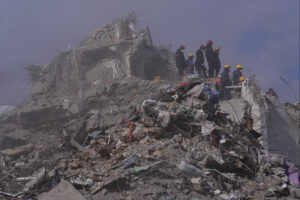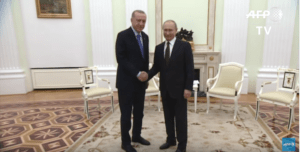The Danger of Meddling in Syria’s Turmoil
The American public does not want still another war. Surely, that is clear even to the post-neoconservatives raising their heads again in Washington.The unclarified mystery about the struggle in Syria is what it is all about. Did it begin in repercussion to the Arab uprisings elsewhere? Or is there a sinister external explanation?
Who began it? The story commonly offered is that children scribbled some grafitti against President Bashar al-Assad on a wall in the provinces, and the police brutally beat or tortured or killed them in reprisal, provoking not the expected fearful silence but a spontaneous popular demonstration against authority, police and regime, producing in return an even more severely brutal response from the regime.
Syria has been one of the stable states in the Arab Middle East despite its internal tensions, and despite having America’s enemy Iran as its neighbor on one side and on the other unstable Lebanon and dangerous Israel. Yet its fundamental problems are not international in origin. As the British Middle East expert Patrick Seale has recently written, the real problems are drought and demography. The drought — from 2006 to 2010 — was the worst in a century. Soaring population has produced huge youth unemployment.
But who reinforced and spread the initial popular uprising, and where did the arms and subsequent organization and promotion of protest come from? What prompted the sentiment that quickly began to be whispered from one person to another, and one town to the next, “Bashar — he’s finished!” Why, and what did anyone actually know? Bashar al-Assad actually was alive, solidly installed in Damascus, commanding — or at least his closest entourage was commanding — a serious modern army and solid security apparatus drawn from his family and clan, and other close relatives and associates, made up mainly from the Shi’ite Alawi sect which has held the government since his father, Hafez al-Assad, staged a successful coup d’etat in 1970. Why should he worry?
Well, he should have worried, since a dissident committee — or committees — suddenly were active abroad. The revolt was getting arms and ammunition. Turkey and then Sunni Qatar and Saudi Arabia were reliably reported to be active.
Assad and his government first claimed that Syria was being invaded by foreign mercenaries, “gangs,” al-Qaida and Arab enemies. Or that it was being invaded by Syrian Muslim Brothers, who fought Bashar’s father.
Then the story being spread outside Syria by Assad’s supporters and enemies of the United States became that NATO and Israel were behind it all, and the plan was to clear an anti-Western Syria out of the way as preliminary to attack Iran and its nuclear facilities, with permanent occupation of Syria and Iran and seizure of its oil — just as in Iraq (where, actually, that supposed NATO plan has not worked so well, handing Iraq over to implicit Iranian domination, and in recent weeks inspiring an insurrection of mounting scale by Sunnis, who once ruled Iraq under Saddam Hussein).
This is also unconvincing since the attack on Iran will be from the air, and a land attack by Western armies to finish off an independent Syria is unnecessary, and scarcely what Barack Obama or even Benjamin Netanyahu and their electorates want to see. Another Western war against Arabs? What about those chemical weapons supposedly reserved for foreigners? And if the attack in not Western in origin, who else? Who in the Arab world wants to be America’s and Israel’s proxy in a war against Syria, where a Western-inspired attack would certainly set alight the torches of nationalism, patriotism and religious passion. It would also supply recruits for al-Qaida’s franchises elsewhere and for Hizballah.
What then? Syria’s may be an ethnically and religiously divided population, but the idea that it could successfully be parceled out into separate states or provinces, governed in a post-Assad condition by anything other than a foreign army of occupation recalls those neo-conservative assurances before the American invasion of Iraq that U.S. troops would be greeted like the Allies liberating France in 1944. It is inane and gravely irresponsible. In any case, the American public does not want still another war. Surely, that is clear even to the post-neoconservatives raising their heads again in Washington. (Robert Kagan comes to mind.)
The only peaceful end to the Syrian crisis is continued international intervention, mediation and negotiation. The Russians have indicated that they will cooperate if their economic and long-standing political interests in Syria are accommodated. Alas, Washington seems to see in this tragic situation an opportunity to force Russia out or the Middle East. That policy will fail — and eventually Barack Obama (or Mitt Romney) will be sorry.
Visit William Pfaff’s website for more on his latest book, “The Irony of Manifest Destiny: The Tragedy of America’s Foreign Policy” (Walker & Co., $25), at www.williampfaff.com.
© 2012 Tribune Media Services, Inc.
Your support matters…Independent journalism is under threat and overshadowed by heavily funded mainstream media.
You can help level the playing field. Become a member.
Your tax-deductible contribution keeps us digging beneath the headlines to give you thought-provoking, investigative reporting and analysis that unearths what's really happening- without compromise.
Give today to support our courageous, independent journalists.





You need to be a supporter to comment.
There are currently no responses to this article.
Be the first to respond.